☁️ Langblr. Studyblr. Bujo. Focus. Cozy. Warm Atmospheric Studying. ☁️
Don't wanna be here? Send us removal request.
Text
[KOR/ENG LYRICS] D-Day by Agust D
Future’s gonna be okay
Okay okay look at the mirror
and I see no pain
I’d die for real till the D-Day,
but it’s gonna be okay
Time for some paycheck
and I’m ridin’ downtown
Switch over, time tickin’ and over
Future’s gonna be okay
Okay okay look at the mirror
and I see no pain
I’d die for real,
I see karma gon’ be comin’ back for me
Time for some paycheck
and I’m ridin’ downtown
Switch over, time tickin’ and over
D-Day’s coming, it’s a fucking good day
이날을 위해서 여지껏 미로를 거닌듯해 It’s like I’ve been walking through a maze just for this day
어쩌면 어리숙했던 지난날은 이제 over Maybe my foolish past is now over
다시 태어날 우릴 위해 축배를 다시금 들어 Raise a toast again for us who will be reborn
미움이 가득한 세상에 증오는 In a world full of hate, hatred is
더더욱 불필요하네 that much more unnecessary
연꽃은 진흙탕 속에서도 Since lotus flowers bloom splendidly
찬란하게 꽃피우기에 even in swamps
아등바등 남과 비교 열등감 자기혐오 The struggle of comparing myself with others, my inferiority complex, self-loathing
이런 것들로 향해 오늘부로 총구를 겨눠 These are the things at which I am pointing the gun today
당신은 무엇인가? 한계 따윈 부셔내 인마 What are you? Break past the limits, man
과거를 후회 말고 미래를 Don’t regret the past and
두려워하지 마 인마 don’t fear the future, man
피할 수 없음 맞고 That’s right, you can’t escape it
충분히 아프고 말길 yeah I hope you’ll suffer just enough, yeah
괜히 상처를 헤집으면서 I hope you won’t pick at your wounds for no reason
흉터를 키우질 말길 yeah and cause them to scar, yeah
I can’t remember
I can’t remember
I can’t remember
Don’t say no more
I can’t remember
I can’t remember
Switch over, time tickin’ and over
Future’s gonna be okay
Okay okay look at the mirror
and I see no pain
I’d die for real, till the D-Day
but it’s gonna be okay
Time for some paycheck
and I’m ridin’ downtown
Switch over, time tickin’ and over
Future’s gonna be okay
Okay okay look at the mirror
and I see no pain
I’d die for real,
I see karma gon’ be comin’ back for me
Time for some paycheck
and I’m ridin’ downtown
Switch over, time tickin’ and over
D-Day’s coming 금지된 것들로부터 D-Day’s coming, as you’re liberated from what was forbidden,
해방됨과 동시에 당신의 뉴 챕터를 열어 start a new chapter in your life
고여 있기엔 우리는 여전히 젊고도 어려 We’re still too young and immature to be standing still*
어제보다 나은 오늘을 위한 최소의 노력 Doing the bare minimum to make today better than yesterday
당신은 무엇인가? 한계 따윈 없는 거야 인마 What are you? There really are no limits, man
과거는 지나갔고 미래는 먼 얘기 The past is over and the future is still far away
뭘 두려워해 인마 What are you afraid of, man?
과거는 과거일 뿐 현재는 현재일 뿐 The past is just the past, the present is just the present
미래는 미래일 뿐 과한 의미 부연 The future is just the future, making it more than that
힘들어 십중팔구 is too much of a pain, nine times out of ten
오늘부로 미로를 지나 새로운 시작을 시작 From this day onwards, a new start beyond the maze begins
증오로 뒤덮인 세상에 다시 연꽃이 핀다 In a world full of hatred, a lotus flower blooms again
그래 D-Day’s coming That’s right, D-Day’s coming
당당히 가슴을 펴길 yeah Hoping you puff your chest out proudly, yeah
증명은 당신 몫이니 부디 증명해 내길 yeah The proof is yours to give, so I hope you go and give it, yeah
I can’t remember
I can’t remember
I can’t remember
Don’t say no more
I can’t remember
I can’t remember
Switch over, time tickin’ and over
Future’s gonna be okay
Okay okay look at the mirror
and I see no pain
I’d die for real, till the D-Day
but it’s gonna be okay
Time for some paycheck
and I’m ridin’ downtown
Switch over, time tickin’ and over
Future’s gonna be okay
Okay okay look at the mirror
and I see no pain
I’d die for real,
I see karma gon’ be comin’ back for me
Time for some paycheck
and I’m ridin’ downtown
Switch over, time tickin’ and over
Translators’ Note:
*This line resembles one from SUGA’s Interlude (with Halsey): “꾸물거리기엔 우린 아직 젊고 어려/We are still too young and full of youth to be dragging our feet”.
Trans cr; Rinne | Spot Check cr; Aditi, Annie & Faith @ bts-trans © TAKE OUT WITH FULL CREDITS
144 notes
·
View notes
Text
[KOR/ENG LYRICS] D-Day by Agust D
Future’s gonna be okay
Okay okay look at the mirror
and I see no pain
I’d die for real till the D-Day,
but it’s gonna be okay
Time for some paycheck
and I’m ridin’ downtown
Switch over, time tickin’ and over
Future’s gonna be okay
Okay okay look at the mirror
and I see no pain
I’d die for real,
I see karma gon’ be comin’ back for me
Time for some paycheck
and I’m ridin’ downtown
Switch over, time tickin’ and over
D-Day’s coming, it’s a fucking good day
이날을 위해서 여지껏 미로를 거닌듯해 It’s like I’ve been walking through a maze just for this day
어쩌면 어리숙했던 지난날은 이제 over Maybe my foolish past is now over
다시 태어날 우릴 위해 축배를 다시금 들어 Raise a toast again for us who will be reborn
미움이 가득한 세상에 증오는 In a world full of hate, hatred is
더더욱 불필요하네 that much more unnecessary
연꽃은 진흙탕 속에서도 Since lotus flowers bloom splendidly
찬란하게 꽃피우기에 even in swamps
아등바등 남과 비교 열등감 자기혐오 The struggle of comparing myself with others, my inferiority complex, self-loathing
이런 것들로 향해 오늘부로 총구를 겨눠 These are the things at which I am pointing the gun today
당신은 무엇인가? 한계 따윈 부셔내 인마 What are you? Break past the limits, man
과거를 후회 말고 미래를 Don’t regret the past and
두려워하지 마 인마 don’t fear the future, man
피할 수 없음 맞고 That’s right, you can’t escape it
충분히 아프고 말길 yeah I hope you’ll suffer just enough, yeah
괜히 상처를 헤집으면서 I hope you won’t pick at your wounds for no reason
흉터를 키우질 말길 yeah and cause them to scar, yeah
I can’t remember
I can’t remember
I can’t remember
Don’t say no more
I can’t remember
I can’t remember
Switch over, time tickin’ and over
Future’s gonna be okay
Okay okay look at the mirror
and I see no pain
I’d die for real, till the D-Day
but it’s gonna be okay
Time for some paycheck
and I’m ridin’ downtown
Switch over, time tickin’ and over
Future’s gonna be okay
Okay okay look at the mirror
and I see no pain
I’d die for real,
I see karma gon’ be comin’ back for me
Time for some paycheck
and I’m ridin’ downtown
Switch over, time tickin’ and over
D-Day’s coming 금지된 것들로부터 D-Day’s coming, as you’re liberated from what was forbidden,
해방됨과 동시에 당신의 뉴 챕터를 열어 start a new chapter in your life
고여 있기엔 우리는 여전히 젊고도 어려 We’re still too young and immature to be standing still*
어제보다 나은 오늘을 위한 최소의 노력 Doing the bare minimum to make today better than yesterday
당신은 무엇인가? 한계 따윈 없는 거야 인마 What are you? There really are no limits, man
과거는 지나갔고 미래는 먼 얘기 The past is over and the future is still far away
뭘 두려워해 인마 What are you afraid of, man?
과거는 과거일 뿐 현재는 현재일 뿐 The past is just the past, the present is just the present
미래는 미래일 뿐 과한 의미 부연 The future is just the future, making it more than that
힘들어 십중팔구 is too much of a pain, nine times out of ten
오늘부로 미로를 지나 새로운 시작을 시작 From this day onwards, a new start beyond the maze begins
증오로 뒤덮인 세상에 다시 연꽃이 핀다 In a world full of hatred, a lotus flower blooms again
그래 D-Day’s coming That’s right, D-Day’s coming
당당히 가슴을 펴길 yeah Hoping you puff your chest out proudly, yeah
증명은 당신 몫이니 부디 증명해 내길 yeah The proof is yours to give, so I hope you go and give it, yeah
I can’t remember
I can’t remember
I can’t remember
Don’t say no more
I can’t remember
I can’t remember
Switch over, time tickin’ and over
Future’s gonna be okay
Okay okay look at the mirror
and I see no pain
I’d die for real, till the D-Day
but it’s gonna be okay
Time for some paycheck
and I’m ridin’ downtown
Switch over, time tickin’ and over
Future’s gonna be okay
Okay okay look at the mirror
and I see no pain
I’d die for real,
I see karma gon’ be comin’ back for me
Time for some paycheck
and I’m ridin’ downtown
Switch over, time tickin’ and over
Translators’ Note:
*This line resembles one from SUGA’s Interlude (with Halsey): “꾸물거리기엔 우린 아직 젊고 어려/We are still too young and full of youth to be dragging our feet”.
Trans cr; Rinne | Spot Check cr; Aditi, Annie & Faith @ bts-trans © TAKE OUT WITH FULL CREDITS
144 notes
·
View notes
Text
🌀Random Post 🌀
이제 저는 게임을 하고 있어요
2 notes
·
View notes
Text
겹받침, two consonants at the end of a syllable.
Today, i'll teach you how do you pronounce when you have two consonants at the end of a syllable. It's more easy than you can think, and you will get used to it very soon.
I'll give you the examples first, and then, how do you have to pronounce it.
넋, 앉, ��, 많, 싫, 여덟, 곬, 핥, 닭, 삶, 읊.
As you can see, all of them have two consonants at the bottom of the syllable, and only one of them sounds when you speak.
Then, how you pronounce all of it?
Following the same order, we have all of this. You just have to learn these. The red ones are what you pronounce when you speak.
ㄱㅅ - ㄴㅈ - ㅂㅅ - ㄴㅎ
ㄹㅎ - ㄹㅂ - ㄹㅅ - ㄹㅌ
ㄹㄱ - ㄹㅁ - ㄹㅍ
So, when you say 넋 you are saying "넉" (it's not the same word, it's just how it sounds; keep this in mind, please!!!!)
There are some exceptions for this rule:
If a word comes with ㄺ followed by ㄱ.
If the next syllable beggins with a vowel.
Want to know what each word means? Click down below.
넋, means soul.
앉[다], means to sit.
값, means price.
많, means a lot.
싫[다], means to hate.
여덟, means eight.
곬, means direction.
핥[다], means to lick.
닭, means chicken, hen, rooster, etc.
삶, means life.
읊, means recite.
254 notes
·
View notes
Note
Hiii I was wondering if you can do a lot of sentences of how 이/가 and 는/은 are different. Maybe some include the 을/를 too. And also some that have both 는/은 and 이/가 ☺️☺️
anon asked: I see a lot of posts on Tumblr about 이/가 but they just leave me more confused. Can you help? thanks
Sentences to Showcase the Usage of 이/가 and 은/는: [+what are they?]
Please go here for more context on how/when to use them. This post will be kinda long, so I’ll put a TLDR at the top.
TLDR; if the main noun is an agent then use, 은/는 or if the main noun is an experiencer, then use 이/가
Now, what the hell is an agent or an experiencer. A good way to figure this out is to ask yourself, “is the entity doing the action or undergoing the event?” 은/는 are general particles (commonly used for the agent as they are the ones doing or causing the action), whereas 이/가 are particles used to emphasize (commonly used for the experiencer as they are in contact with the event; I will explain more later in the blog). Both are nominative—which is what makes the argument of “subject” and “topic” extremely confusing and meaningless because they don’t accurately identify the noun’s role in the sentence.
I am fortunate enough to have studied thematic roles and syntax in depth during my time in linguistics, however, I understand that a lot of my followers haven’t! So, I will give you a visual:
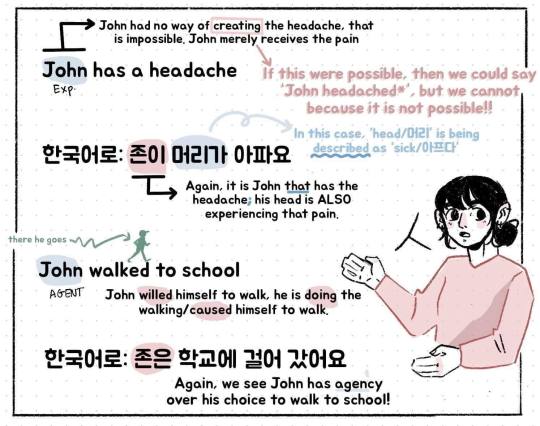
So again, ask yourself, “who/what is doing/causing the action?” or “who/what is undergoing the event?” Sometimes, it is also easy to look at the verb or adjective and make a judgement there considering it's common** for 이/가 to go with adjectives and common for 은/는 to go with verbs. Another way to think about it: if you need to place emphasis on the agent, then you can use 이/가.
** just because it's common, it does not mean it's a rule (however, it is a good tip)
Below is an example of why the above statement is not a rule.
이다 [to be] is special because it is a copula. A copula is a verb that joins/links the main noun and it's complement. We have many copulas in English (BE, feel, smell, look, become--to name a few). Korean has three: 이다, 아니다, and 되다.
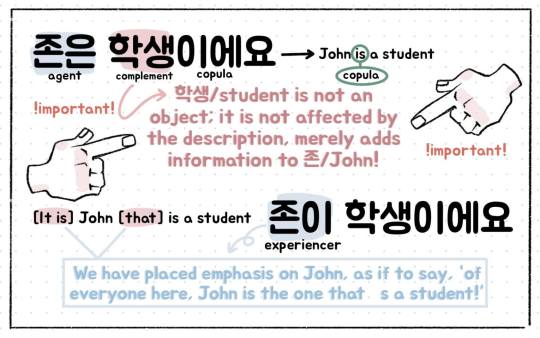
Let’s try to place it in a sentence where both 은/는 and 이/가 occur in contrast:
매일 신발들은 신어야 하는데 오늘은 이 신발이 안 신으면 안 돼요
In the sentence above ^^, the dependent clause [매일 신발들은 신어야 하는데] gives background information for the main clause [오늘은 이 신발이 안 신으면 안 돼요]. “Generally,” the speaker says, “everyday I have to wear shoes, but I must wear these shoes [specifically] today.”
The sentence shows that there is something emphasized about the shoes; “these shoes must undergo being worn by me”. Whatever the reason may be, the speaker intentionally highlighted the shoes in the second clause as the ones that they must wear that day.
Summary so far:
1) If the main noun is doing the action, use 은/는
2) If the main noun is undergoing the action, use 이/가
3) If you want to emphasize the main noun, use 이/가
Hopefully, you’re still following me. Let’s look at other examples:
오늘은 날씨가 좋아요 - today, the weather is good
그 이어폰은 제 게 아니에요 [게 = 것+이] - Those earphones aren’t mine
새로운 선생님이 여자예요 - the new teacher is a woman
선생님은 한국 분이 아니에요 - the teacher is not Korean
제 이름은 지연이 아니고 희주예요 - My name is Heeju, not Jiyeon
비빔밥 말고 다른 한식이 있어요? - Other than bibimbap, do you have other Korean food?
그 남자는 캐나다에 갈 때 미혼이 아닐 거 같아요 - I don’t think that man will be single if/when he travels to Canada
Here’s the worst part; sometimes, there’s no fkn difference between the meanings. Which also makes it confusing. So, try to stick to the rules in the post linked and the patterns from this post.
1. Use 이/가 after an object when you’re describing an agent’s feelings or state of mind
EX. 존은 책을 읽는 게 좋아요; 존은 책이 좋아요 = John likes (reading) books
2. Use 이/가 after the noun that precedes (goes before) a copula
EX. 존은 한국에 온 지 3년이 되었어요 = John has been in Korea for 3 years
3. Adjectives and Intransitive verbs (no object), can take on 이/가 if you want to emphasize the main noun
EX. 내일은 날씨가 바람이 불 거 같아요 = It seems like it’s going to be windy tomorrow
4. Transitive verbs (takes an object), usually use 이/가 for the first noun and 을/를 for the object
EX. 존이 이를 닦는 중이에요 = John is [in the middle] of brushing his teeth
Okay! I really hope this helped! If there’s still any confusion, please don’t hesitate to send me a message to ask for clarification or more examples! 이/가 and 은/는 are honestly some of the hardest for English speakers learning Korean to grasp because we don’t really have particles like this that distinguish nouns in English. Though, with this, I hope you can get better at it!
Happy Learning :)
~ SK101
335 notes
·
View notes
Photo
너는 파라다이스 길리 (You’re Paradise Gilly) 🌿🍌🥥

1K notes
·
View notes
Text
Websites for learning Korean
(i will only be adding links)
Howtostudykorean.com
Freshkorean.com
Talktomeinkorean.com
90daykorean.com
Koreanclass101.com
Topikguide.com
Coursera.org
Koreanwikiproject.com
Easytolearnkorean.com
Studytopic.go.kr
Sooandcarrots.com
Rawkorean.com
Ilovelanguages.org
I will keep adding if i find more websites. if you know of any other websites, you can add them too (by reblogging ofc ☺︎).
These are only websites and not apps or yt channels, i'll make a seaparate post for that.

2K notes
·
View notes
Text
하다 — TO DO
declarative past
informal low: 했어
formal low: 했다
formal medium: 했어요
formal high: 했습니다
inquisitive past
informal low: 했어?
formal low: 했니?
formal medium: 했어요?
formal high: 했습니까?
declarative present
informal low: 해
formal low: 한다
formal medium: 해요
formal high: 합니다
inquisitive present
informal low: 해?
formal low: 하니?
formal medium: 해요?
formal high: 합니까?
declarative future
informal low: 할 거야
formal low: 할 거다
formal medium: 할 거예요
formal high: 할 겁니다
conditional future
informal low: 하겠어
formal low: 하겠다
formal medium: 하겠어요
formal high: 하겠습니다
imperative
informal low: 해
formal low: 해라
formal medium: 하세요
formal high: 하십소오
propositive
informal low: 해
formal low: 하자
formal medium: 해요
formal high: 합시다
other:
connective if: 하면
connective and: 하고
nominal -ing: 함
150 notes
·
View notes
Text
HOW TO SPEAK KOREAN:
Korean Conversation Practice

CONVERSATION:
G: 누구하고 그렇게 길게 통화했어?
Who did you talk to so long?
B: 여자 친구랑. 여자 친구가 잠이 안 온다고 해서 통화가 길어졌어.
I talked to my girlfriend. The call took longer because she said she couldn't get asleep.
G: 여자 친구? 너 여자 친구 없잖아.
Girlfriend? You don't have a girlfriend.
B: 그제 소개팅해서 만난 사람이랑 사귀기로 해서 이제 사귄 지 사흘 됐어.
I decided to date the whom I met on a blind date the day before yesterday, and it's been three days now.
G: 뭐? 그저께 처음 만났는데 벌써 사귄다고?
What? You met her for the first time the day before yesterday, and you are already in relationship?
B: 응, 보자마자 첫눈에 반해서 내가 먼저 사귀자고 했어.
Yes, I fell in love with her at first sight and asked her to go out with me first.
G: 엄청 예쁜가 보네. 어떤 사람인데?
She must be very pretty. What kind of person she is?
B: 나랑 대화가 통하는 사람이랄까? 아직 서로 알아 가는 단계야.
I would say she's the one I can talk to. We're still in the process of getting to know each other.
BREAKDOWN:
🍁누구하고 그렇게 길게 통화했어?
-하고 = with, and
길다 + 게 = to be long (in length)
🍁여자 친구랑. 여자 친구가 잠이 안 온다고 해서 통화가 길어졌어.
(이)랑 = with
ㄴ/는다고 하다 = quoting someone
아/어/해서 = because, so
아/어지다 = to become
🍁여자 친구? 너 여자 친구 없잖아.
잖아(요) = kind of like "you know you don't have a girlfriend."
🍁그제 소개팅해서 만난 사람이랑 사귀기로 해서 이제 사귄 지 사흘 됐어.
만난 사람 = the person I met
기로 하다 = to decide (to do something$
ㄴ지 (time) 되다 = it's been (time) long, or this (amount of time) has passed
🍁뭐? 그저께 처음 만났는데 벌써 사귄다고?
ㄴ다고(요) = used to confirm what the speaker just said or to express shock at what someone just said
🍁응, 보자마자 첫눈에 반해서 내가 먼저 사귀자고 했어.
자마자 = as soon as, right after
자고 하다 = quoting someone with ~자
(사귀자 > 사귀자고 했어요)
🍁엄청 예쁜가 보네. 어떤 사람인데?
ㄴ가 보다 = seems like, looks like
> the speaker observes something to be a certain way based on what they saw or heard
🍁나랑 대화가 통하는 사람이랄까? 아직 서로 알아 가는 단계야.
이라고 할까 = 이랄까
알아 가는 단계 = getting to know each other stage
🖤Vocabulary List🖤
누구 = who
그렇게 = like that
길다 = to be long
통화하다 = to call
여자 친구 = girlfriend
잠이 안 오다 = can't go to sleep
길어지다 = to become longer, get longer
없다 = to not have
그제 = the day before yesterday
소개팅��다 = a blind date
만나다 = to meet
사람 = person
사귀다 = to
이제 = now
사흘 = 4 days
되다 = to be; pass
뭐 = what
그저께 = The day before yesterday
처음 = first
벌써 = already
응 = yes (informal)
보다 = to see
첫눈에 반하다 = love at first sight
먼저 = first (before anything else)
엄청 = extremely, very
예쁘다 = to be pretty
어떤 = which, what kind
대화가 통하는 사람 = A person to talk to
아직 = still
서로 = each other
알아 가는 단계 = getting to know each other stage
단계 = stage
135 notes
·
View notes
Text
🌀 Random 🌀
안녕하세요 여러분~
잘 지내세요?? 😊
와, 오랜만이죠? ㅎㅎ ㅠ 그것은 미안해요.
요즘 저는 무슨 말을 할지 몰랐어요… ㅠ
한국어 공부는 어려워서 천천히 배우고 복습하고 있어요..
저는 시간이 늦어서 지금 졸려요.
다시 올 거예요.. 괜찮아요? 😊
잘 자요!! 🌙✨
(( as always, ❕corrections are welcomed ❕))
#langblr korean#korean with ri 🔮✨#study blog#korean#mildliners korean#🌀 random posts 🌀#practice daily..even if it’s a little bit✨#practicing korean sentences#Korean writing practice#studyblr#langblr
1 note
·
View note
Note
hi ! i just learned that 생일 and 생신 both mean birthday, but that the 생일 is casual while 생신 is polite.
• does that mean that the first one should only be used when talking TO friends/younger people and the latter when talking TO strangers/elderly people ?
• or does it mean that the first one should be used when talking ABOUT friends/younger people’s birthdays and the latter when talking ABOUT people we have to be respectful towards ?
Hi! Awesome question! If my understanding is correct, the second bullet point is correct. If I were talking to my friend who is the same age as me, and I wanted to say that it's my mom's birthday today, I would say 오늘은 엄마의 생신이야. I speak informally to my friend, hence the -이야 at the end, but I use 생신 because I'm talking about my mother's birthday.
If I'm saying it's my younger sibling's birthday though, I could say 오늘은 동생의 생일이에요. I could say this sentence to someone I'd speak politely to, hence the -이에요, but I say 생일 because I'm talking about my younger sibling. I hope that makes sense, thanks for the question! 화이팅!
87 notes
·
View notes
Text
🌀Random Post 🌀
헐..정말 추워요! ㅠㅠ

1 note
·
View note
Text
🌀Random Post 🌀
안녕하세요 여러분~
오랜만에요. 😅
전 할 말이 없어요.. ㅠ
잘 자요~
#langblr korean#korean#studyblr#korean with ri 🔮✨#self learning korean#🌀 random posts 🌀#short writing#random writing
0 notes
Text
Coldplay X BTS - My Universe [trans+vocab]
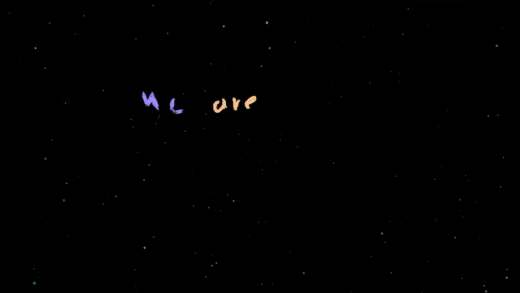
You (You), you are (You are) my universe And I (I), just want (Just want) to put you first You (You), you are (You are) my universe, and I
매일밤 네게 날아가 꿈이란 것도 잊은 채 나 웃으며 너를 만나 Never ending forever, baby
➼ 매일밤 - every night ➼ 날아가다 - to fly ➼ 꿈 - dream ➼ 잊다 - to forget ➼ 웃다 - to smile, laugh ➼ 만나다 - to meet
I fly to you every night, while forgetting it’s a dream I’m meeting you with a smile, never ending forever baby
어둠이 내겐 더 편했었지 길어진 그림자 속에서 (Eyes) And they said that we can’t be together Because, because we come from different sides
➼ 어둠 - darkness ➼ 편하다 - to be comfortable ➼ 길어지다 - to get longer ➼ 그림자 - shadow ➼ 속 - inside
Darkness was more comfortable for me, in the long shadows
나를 밝혀주는 건 너란 사랑으로 수 놓아진 별 내 우주의 넌 또 다른 세상을 만들어 주는 걸
➼ 밝히다 - to light up ➼ 사랑 - love ➼ 수(를) 놓다 - to embroider ➼ 별 - star ➼ 우주 - universe ➼ 세상 - world ➼ 만들다 - to create
The thing that lights me up, the stars embroidered with your love The you of my universe, you create another world
너는 내 별이자 나의 우주니까 지금 이 시련도 결국엔 잠시니까 너는 언제까지나 지금처럼 밝게만 빛나줘 우리는 너를 따라 이 긴 밤을 수놓을 거야
➼ 시련 - hardship, trial ➼ 결국 - in the end ➼ 잠시 - a while ➼ 언제까지나 - always, until whenever ➼ 지금 - now ➼ 밝게 - brightly ➼ 빛나다 - to shine ➼ 따르다 - to follow ➼ 길다 - to be long
Because you’re my star and my universe, Because in the end, even this trial is only temporary You just shine brightly, always, just like now We will follow you and embroider this long night
너와 함께 날아가 When I’m without you I’m crazy 자 어서 내 손을 잡아 We are made of each other, baby
➼ 함께 - together ➼ 자 - an incentive without a translatable meaning (as far as I know of) ➼ 어서 - fast ➼ 손을 잡다 - to hold one’s hand
I fly together with you, when I’m without you I’m crazy Now, hold my hand, we are made of each other baby
102 notes
·
View notes
Photo


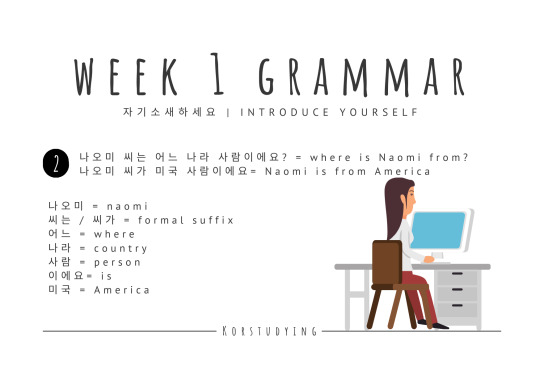
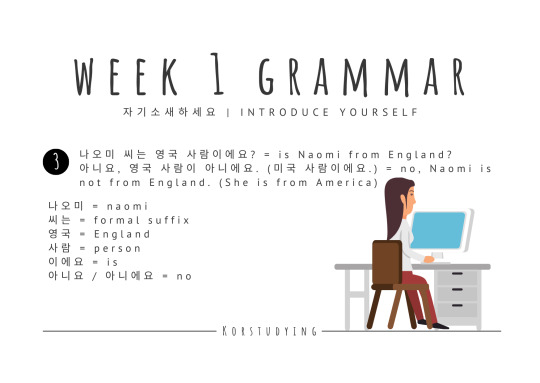
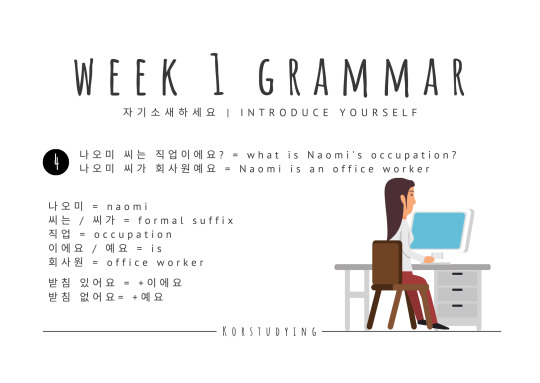

Week 1 Grammar
Here’s the grammar for week 1 of studying Korean! If you have any questions feel free to send me an ask or shoot me a message. I will gladly help you! 화이팅!
130 notes
·
View notes
Note
May I ask how can i combine sentences? Like I want to say a sentence like "She said that she wanted to play", or basically just any sentences with the structure of 'S + V + that + clause'. Thank you so much for helping 😆
The way you say "that" in Korean depends on what exactly it is you want to say! If you're quoting somebody, you would have to use -라고/다고. Check out my lesson here for more info about it! The sentence you provided can be translated as:
걔가 놀고 싶다고 했어요. = She said that she wanted to play.
You can also use -는 것 to say “that,” as in “the food that I cook” or “the house that I live in.” For instance:
제 남자친구는 제가 요리하는 음식을 좋아해요. = My boyfriend likes the food that I cook.
제가 사는 집은 작아요. = The house that I live in is small.
More on this in my lessons here!:
Describing Nouns with Verbs (-는 것)
Describing Nouns with Verbs - Past & Future Tense (-ㄴ/은 / -ㄹ/을 것)
If you want to say something like “I know that...” you can essentially combine the two and make -란 것/-단 것:
미적분학이 어렵단 걸 알아요. = I know that calculus is hard.
If you understand -는 것 and -다고, I think -란/-단 것 will be easier to understand, so be sure to check out the lessons I mentioned! This was a very brief overview, but I hope that it was helpful and that it gives you some sort of idea as to how to say “that” in certain contexts! 화이팅!
55 notes
·
View notes
Text
Upper-Beginner / Lesson 9: How to Use -(으)로
안녕하세요! Hey everyone! This lesson is going to show you all how to use -(으)로. Let’s start!
-(으)로 meaning “Using”
-(으)로 is a particle typically attached to nouns: -으로 is attached to nouns ending in a consonant, while -로 is attached to those ending in a vowel. Probably the most common usage is meaning “with,” but a specific kind of “with.” Let’s see an example!
저는 이 그림을 연필로 그렸어요. = I drew this drawing with a pencil.
Important note about irregulars: attach just -로 to nouns ending in ㄹ – it’s easier to pronounce that way!
연필 = pencil
그림을 그리다 = to draw a picture
In this sentence, “with” means “using” essentially, and we use -로 for this – I drew this using a pencil. A pencil was the tool with which I drew the picture. Let’s see some more examples!
언니가 컴퓨터로 에쎄이를 써요. = My older sister writes her essay on the computer.
Here, -로 means “on,” according to the translation. But it functions the same way as it did in the first sentence – my sister wrote her essay using the computer.
저는 인터넷으로 한국어를 공부해요. = I study Korean using the Internet.
You can say this when someone asks “한국어를 어떻게 공부해요?” meaning “how do you study Korean?” -(으)로 is a good way to answer “how” questions like that!
민지 씨는 지하철로 서울에 갔어요. = Minji went to Seoul by subway.
It’s also useful for describing how you got somewhere as shown here! Minji got to Seoul via taking the subway.
-(으)로 and Locations
You might also see -(으)로 when someone/something is going towards a location. For example:
저 쪽으로 가세요. = Go that way. / Go in that direction.
저 쪽 = that way / that direction
According to studywithbee.com, however, it is not interchangeable with the location particle, -에. When you use -(으)로 with a place or direction, you’re talking more about the movement toward that place or direction, not exactly the destination the destination itself or your position. Think of -에 as static and -(으)로 as mobile if that makes sense.
Using -(으)로 for Change
If you want to say that you changed something to something else, you can attach -(으)로 to the noun that it is being changed to. For example:
종인 씨는 이름을 카이로 바꿨어요. = Jongin changed his name to Kai.
신호등이 빨간색으로 바뀌었으니까 건너가면 안 돼요. = The light changed to red, so you can’t cross.
이걸 영어로 번역하세요. = Please translate this into English.
달러를 원으로 전환했어요. = I converted the dollars to won.
So that’s a general overview of some of the most common ways to use -(으)로! Hope this was helpful! 화이팅!
My masterlist
Join my Discord chat here to practice Korean with others!
Follow me on Instagram here for more Korean content!
Get Drops Premium using my affiliate link to expand your Korean vocab!
Check out my Ko-Fi to support this blog and my studies! Thank you for your generosity!
87 notes
·
View notes